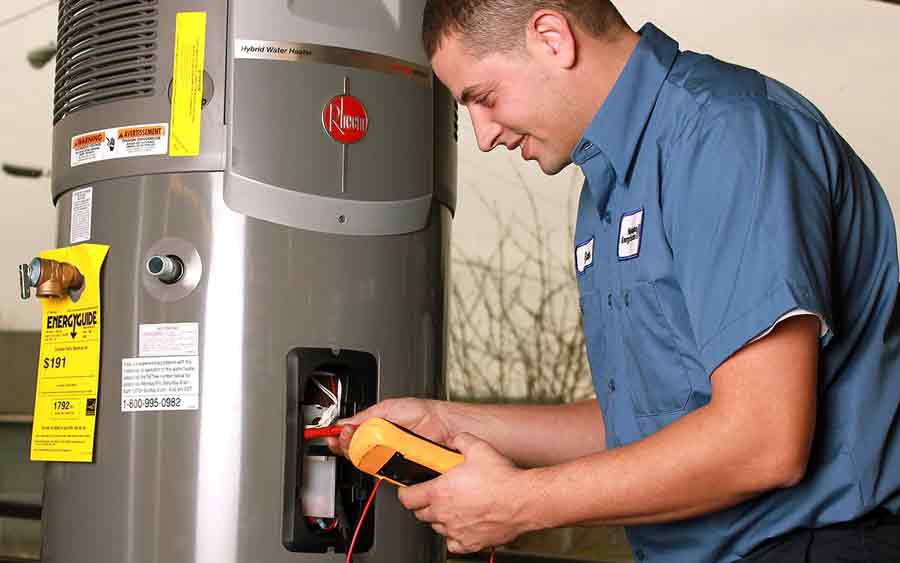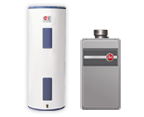
2015 government changes to water heaters will affect you
Who made the new rulings?
The National Appliance Energy Conservation Act (NAECA) was approved by Congress and is administered by the US Department of Energy (DOE). This is the same organization that oversees the EnergyStar program. That translates to: this is serious business and a real change for all water heaters sold in the US.
What are the new water heater regulations?
Water heaters produced after April 16, 2015 must conform to new energy efficiency standards. These translate to a mandatory increase of 3% – 30% greater efficiency vs. current models. The amount varies by tank size based on formulas. The larger the tank, the more the efficiency is required. The gains in efficiency are small, but given that the vast majority of homes in America have a water heater; small can add up to big savings for the environment.
How does this affect me?
If you have a tankless water heater with an efficiency rating above .82, (all that we sell are at this level), good news, your water heater already complies. However if you are in one of the hundreds of thousands of Western Washington homes, condos and apartments with a standard tank water heater – please read on!
In order to gain the efficiency, manufacturers will be adding additional insulation to water heater tanks. This will impact you as follows:
1. Fitting it in your house. Unlike the new light bulbs that fit in the same sockets as incandescent ones, the new tanks are not going to be the same size. The Rheem tankless water heaters are 27-1/2″ in height, 18-1/2″ in width and 9-3/4″ in depth. If you have a tight closet or a small door, you may have to relocate your water heater, or take off door jambs to bring it in. And sorry, we (or any installer) would have to charge for that if we did it. There will also be new and larger venting required for some gas water heaters.
2. Manufacturer price increase. All of the manufacturers will have to re-tool production lines, and this is expensive. Combine that with increased materials cost from adding more insulation to tanks and we anticipate retail price increases in the range of $100.
3. Custom install solutions needed. To fit some homes and apartments may require creative planning on the part of your installer. For example: If a 50 gallon tank won’t fit, a 40 gallon tank with an added mixing valve may produce the hot water you need. Fortunately our team has the experience to do that.
4. Some larger sized tanks may be discontinued. If you have a large size electric tank (66 or 80 gallon) or 75 gallon gas water heater, some of these are being discontinued. While new products may come along to replace them, the installer community has not yet seen them.
What can I do right now?
Standard water heater tanks last around 8-10 years. If you are thinking it’s time to replace or if you have an older tank located in a tight closet (hello condo & apartment dwellers!), we recommend doing it sooner than later.
Three choices for replacement
1. Upgrade to tank water heaters that already qualify at the new energy efficiency levels, (gas or propane).
2. Replace with your same tank style and size while still available.
3. Consider a move to a tankless water heater.
For gas water heaters, models are available today that meet and actually exceed the new standards. Tankless water heaters are an available option as they run on gas or propane and meet the new energy standards. We also carry super efficient standard tanks, for example, Rheem Power Damper water heaters. They are EnergyStar rated and exceed the new efficiency standards, saving you even more on your water heating costs. This type of water heater costs a bit more than today’s standard gas water heater, but we expect it to be closer in price to the new gas water heaters in 2015. So you can start saving energy now, at around the price you might pay next year.
Current hot water heater tank styles can still be installed after April 16, 2015 but inventory will eventually run out. Installers and suppliers are stocking the last of the available current style tanks as we know many people will want them.
Whatever the new rules bring, Washington Energy will be able to provide you with water heater choices, custom installation and competitive pricing. For a free all-inclusive quote over the phone, please call us at 800-398-4663. Group discounts are available now for condos and apartment buildings.
Related products
- 2016
- AC
- AC Installation
- AC Units
- AFUE
- air conditioing
- air conditioner
- air conditioning
- air conditioning maintenance
- air conditioning service
- air conditioning tune-up
- air duct
- air duct cleaning
- air handlers
- air pollution
- Air Purification System
- air purifier
- Air Sealing
- angie's list
- award
- basement Finishing
- Bathroom remodel
- BBB
- BBB Accredited Business
- before and after
- Best air conditioner
- best filters
- best generator
- best locks
- best water heater
- best window install
- boilers
- bryant
- Bryant AC
- bryant furnace
- bryant heat pump
- christmas lights
- clean air
- clothes drive
- Clothes For Kids
- coat drive
- combi-boiler
- comfort
- community
- Construction
- contractor
- contractors
- Cooling
- Cooling equipment
- Coronavirus Protection
- custom
- daikin
- deals
- discounts
- DIY
- Donation
- Donations
- door hardware
- door installation
- door replacement
- Door Transformations
- doors
- drafty home
- drain cleaning
- Duct Cleaning
- Duct Cleaning Services
- ductless
- Ductless heat pump
- ductless heat pump. mini-split
- Ductless heat pumps
- ductless heating system
- ductless heating systems
- ductless installation
- Ducts
- earth day
- eco friendly
- EER
- election
- electrical inspection
- emergency
- energy
- energy conservation
- energy efficiency
- energy efficiency rebates
- energy efficient AC
- energy efficient air conditioner
- energy efficient home
- energy efficient hvac
- energy efficient HVAC Systems
- energy efficient windows
- energy myths
- energy saving
- energy saving home products
- energy star
- energy tax credit
- environmentally friendly
- exterior doors
- fall
- fall weather
- fiber cement
- fiberglass doors
- filter
- filter change
- financing options
- fireplace
- fireplace insert
- fireplace repair
- fireplace tune-up
- front door
- furnace
- furnace filters
- furnace install
- furnace maintenance
- furnace mileage
- furnace problems
- furnace replacement
- furnace service
- furnaces
- Garage door replacement
- gas fireplace
- gas fireplace inserts
- Gas Fireplace Makeover
- gas furnace
- generators
- going green
- good business practices
- green solutions
- Guardian Maintenance Club
- heat
- heat pump
- heat pump installation
- heat pump maintenance
- heat pump vs ac
- Heat Pumps
- heat pumps maintenance
- heat wave
- Heating
- Heating and Cooling equipment
- heating and cooling systems
- Heating Brands
- Heating Control
- Heating equipment
- Heating System Tuneup
- heatwave
- HEPA filter
- history
- holiday
- home
- home buyer
- home energy
- home energy efficiency
- Home energy efficiency solutions
- home exterior
- home heating
- home improvement
- Home Improvement Rebates
- home improvement repair
- home inspection
- home maintenance
- home maintenance checklist
- home maintence
- home performance
- home protection
- home repair
- home safety
- home upgrade trends
- home upgrades
- home value
- homeowners
- honeywell
- hot water
- hot water heater
- houzz
- how to
- HVAC
- HVAC Contractor
- HVAC Contractors
- hvac system
- IAQ
- indoor air quality
- infographic
- install
- install furnace
- insulation
- intellihot
- interior doors
- kids
- Kitchen face lift
- LED light
- LED lights
- light bulb
- light bulbs
- locks
- mailbag
- maintenance
- march
- membership
- mini-split
- modulating furnace
- money saving
- money savings
- navien
- new door installation
- new home
- New homeowner
- new windows
- news
- pacific northwest weather
- patio doors
- pets
- plumbing
- plumbing inspection
- power
- power outages
- precision tune up
- preventative
- Pro Tips
- Programmable Thermostat
- Programmable Thermostats
- propane
- PSE Award
- PSE Energy
- PUD
- Q & A
- Ratings
- rebates
- refund
- REME Halo
- Remodel
- remodeling hacks
- Replacing Heating System
- reputation
- Safe Home Insulation
- sale
- save energy
- Saving money
- scam
- scams
- seattle
- Seattle Weather
- SEER
- service
- services
- Siding
- Siding replacement
- sliding glass doors
- Smart Home
- Smart thermostat
- smoke
- Solar Attic Fan
- solar power
- Solar Powered Light Strand
- sound
- spring
- standby generators
- storm doors
- summer
- summer fires
- Summer heat
- Summer home
- super service 2016
- tank water heater
- Tank water heaters
- tankless tune ups
- tankless water heater
- tankless water heaters
- tax rebate
- thanksgiving
- Thermostat
- tips
- trends
- tune-up
- upgrade
- upgrade cooling
- upgrade heating
- utilities
- utility rebates
- veterans
- Washington Energy
- washington energy services
- water conservation
- Water Heater
- water heater installation
- water heater maintenance
- water heater repair
- water heaters
- water leak protection
- Wildfire Season
- wildfire smoke
- window
- window energy efficiency
- window install
- window maintence
- window remodel
- window repair
- window replacement
- windows
- winner
- winter
- zone heating
- Air Conditioning
- Air Purifiers
- Cooling
- Doors
- Ductless heat pump
- Environmental
- Fireplace
- Furnace
- Gas fireplace
- Generators
- Heat pump
- Heating
- Home improvement
- How to
- HVAC
- Indoor Air Quality
- Insulation
- News
- Plumbing
- Rebates
- Seattle
- Siding
- Smart Home
- Tank water heaters
- Tankless water heaters
- Tips to save money
- Uncategorized
- Wildfire Season
- Windows
